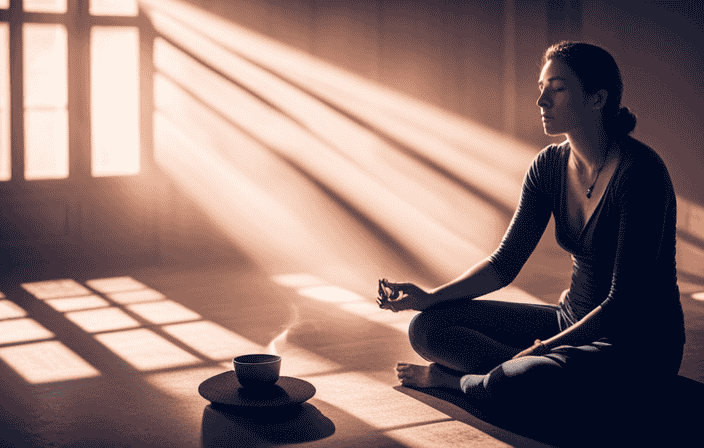Did you know that Vipassana meditation can actually reshape your brain? Neuroimaging studies have revealed that this practice leads to structural and functional changes in the brain, promoting neuroplasticity and mental well-being.
By increasing gray matter density in areas related to attention, emotional regulation, and self-awareness, Vipassana enhances our ability to handle challenges and find emotional balance.
In addition to these brain benefits, Vipassana also reduces stress levels and cultivates mindfulness, making it a powerful tool for personal growth.
Let’s explore the transformative power of Vipassana meditation together.
Key Takeaways
- Regular Vipassana meditation leads to structural and functional brain changes, enhancing brain plasticity and promoting mental well-being.
- Vipassana meditation effectively reduces stress levels and highlights the holistic benefits on overall well-being.
- Vipassana enhances emotional regulation and resilience, reducing overwhelm and improving stress management.
- Integrating Vipassana into daily life through mindful activities and regular retreats can deepen practice and provide renewal.
What is Vipassana?
Vipassana is a meditation technique that focuses on self-awareness and observing sensations, which can lead to transformative changes in one’s mind and overall well-being. Through the practice of Vipassana, individuals learn to cultivate a deep sense of presence and mindfulness.
By observing sensations in the body without judgment or attachment, practitioners develop a greater understanding of the impermanent nature of reality. This technique encourages us to observe our thoughts, emotions, and physical sensations with curiosity and non-reactivity, leading to increased self-awareness and emotional regulation.
During Vipassana retreats, practitioners observe ‘Noble Silence,’ which involves refraining from speaking and maintaining a quiet and introspective environment. This silence allows for a deeper immersion in the practice and facilitates a profound connection with oneself.
Vipassana techniques provide a powerful tool for personal growth and transformation, enabling individuals to navigate life’s challenges with equanimity and compassion.
Benefits of Vipassana
Practicing this technique has numerous benefits. It can increase self-awareness, reduce stress levels, enhance emotional well-being, improve concentration, and promote greater resilience in handling challenges.
Here are four ways that Vipassana meditation can transform your mind:
-
Improving focus: By practicing Vipassana, you learn to anchor your attention in the present moment. This helps train your mind to stay focused and attentive, improving your ability to concentrate on tasks and avoid distractions.
-
Enhancing self-awareness: Vipassana encourages you to observe your thoughts, sensations, and emotions without judgment. This practice of self-awareness allows you to develop a deeper understanding of yourself, your patterns, and your reactions. It helps you gain clarity and insight into your thoughts and behaviors.
-
Reducing stress: Vipassana meditation has been shown to reduce stress levels by activating the relaxation response in the body. Mindfulness and present-moment awareness help calm the mind and release tension, leading to a greater sense of calm and inner peace.
-
Cultivating resilience: Through Vipassana, you learn to observe your emotions without reacting to them. This nonreactivity allows you to develop emotional resilience, enabling you to navigate challenges and setbacks with greater equanimity. It helps you bounce back from difficulties and maintain a positive mindset.
Neuroplasticity and Brain Changes
Experiencing neuroplasticity and changes in the brain is a fascinating aspect of engaging in mindfulness meditation. Regular practice of Vipassana meditation has been shown to lead to structural changes in the brain, promoting mental well-being. Neuroimaging studies have revealed increased gray matter density in regions associated with attention, emotional regulation, and self-awareness. This suggests that Vipassana enhances brain plasticity, allowing for positive changes in these important areas.
To help you visualize the impact of Vipassana on the brain, here is a table summarizing the structural changes and their effects on mental well-being:
| Structural Changes | Mental Well-being |
|---|---|
| Increased gray matter density in attention regions | Improved focus and concentration |
| Increased gray matter density in emotional regulation regions | Enhanced emotional well-being and regulation |
| Increased gray matter density in self-awareness regions | Heightened self-awareness and self-reflection |
Engaging in Vipassana meditation not only allows for these structural changes to occur but also promotes mental well-being by cultivating mindfulness, self-awareness, and emotional regulation. It’s truly remarkable how a simple practice can have such profound effects on our brains and overall well-being.
Stress Reduction and Mind-Body Connection
Engaging in mindfulness meditation has been shown to effectively reduce stress levels and promote a mind-body connection.
Mindfulness practices, such as Vipassana meditation, bring our attention to the present moment and help us cultivate a deep sense of awareness.
By focusing on our breath and observing our sensations without judgment, we can create a space between ourselves and our thoughts, allowing us to respond to stressors with greater ease.
This practice has been found to lower physiological stress markers, such as cortisol, and improve our overall well-being.
Through mindfulness, we can gain a greater understanding of the mind-body connection and develop the ability to navigate the challenges of life with equanimity.
Emotional Regulation and Resilience
Developing emotional regulation and resilience is a key aspect of my journey with Vipassana meditation. Through the practice of mindfulness and nonreactivity towards my emotions, I have learned to build resilience and effectively manage my emotional state. Vipassana has taught me to observe my emotions without judgment or attachment, allowing me to gain a deeper understanding of their nature. This has helped me become more aware of my triggers and patterns, enabling me to respond to challenging situations with greater equanimity and composure.
To illustrate the importance of emotional regulation and resilience in the practice of Vipassana meditation, I have created a table that highlights the benefits of developing these qualities:
| Building Resilience | Managing Emotions |
|---|---|
| – Increases capacity to bounce back from adversity | – Reduces impulsivity and reactivity |
| – Enhances ability to adapt to change and uncertainty | – Improves emotional well-being |
| – Promotes mental strength and perseverance | – Fosters healthier relationships |
| – Cultivates a positive mindset and attitude | – Enhances overall life satisfaction |
| – Boosts self-confidence and self-esteem | – Facilitates effective stress management |
By cultivating emotional regulation and resilience through Vipassana meditation, I have experienced profound personal growth and a greater sense of inner peace. This practice has equipped me with invaluable tools for navigating life’s challenges with grace and compassion.
Integrating Vipassana into Your Lifestyle
Integrating Vipassana into my lifestyle has had a profound impact on my daily life beyond formal practice.
The practice of mindfulness has seeped into every aspect of my being, including how I approach food. Mindful eating has become a sacred ritual for me, where I take the time to truly savor each bite, appreciating the flavors, textures, and nourishment it provides.
This practice has not only helped me develop a healthier relationship with food but has also allowed me to be more present in the moment and cultivate a deeper sense of gratitude.
Additionally, I have incorporated daily mindfulness practices into my routine, such as mindful walking, breathing exercises, and moments of stillness. These small moments of mindfulness throughout the day have helped me stay grounded, centered, and connected to myself and the present moment.
Cultivating Compassion and Kindness
Practicing Vipassana has opened my heart to cultivating compassion and kindness towards others. It has taught me the power of practicing compassion and developing empathy in my interactions with the world around me. Through Vipassana, I have learned that true compassion starts from within and radiates outwards, touching the lives of those around me.
In my journey, I have discovered three key ways in which Vipassana has helped me cultivate compassion and kindness:
-
Practicing acts of generosity: Vipassana has taught me the importance of giving without expecting anything in return. Small acts of kindness, such as offering a helping hand or a listening ear, can have a profound impact on someone’s day.
-
Cultivating empathy: By cultivating mindfulness and self-awareness, Vipassana has helped me develop a deeper understanding of others’ experiences and emotions. This empathy allows me to approach situations with compassion and understanding, fostering deeper connections and relationships.
-
Spreading understanding and love: Vipassana has shown me the power of spreading love and understanding in the world. Through practicing non-judgment and acceptance, I can create a positive ripple effect in my relationships and contribute to a more compassionate and kinder world.
Practicing Vipassana has truly transformed my perspective on compassion and kindness. It has become an integral part of my journey towards personal growth and inner peace.
Starting Vipassana
To begin my Vipassana journey, I attended a 10-day course at a Vipassana center, where I received guidance, instruction, and support in a nurturing environment.
The course introduced me to the transformative power of Vipassana techniques and mindfulness practices. During the course, I learned to observe sensations in my body with a non-judgmental and non-reactive attitude. This allowed me to develop a deeper understanding of my own mind and emotions.
The instructors taught us various mindfulness techniques to cultivate present-moment awareness and to stay grounded in the here and now. Through regular practice, I began to experience a sense of inner peace and clarity.
The course provided a solid foundation for my Vipassana practice, and I continue to integrate these techniques into my daily life, finding solace and tranquility in each moment.
Four Stages of Meditation
During my Vipassana journey, I experienced the four stages of meditation. These stages involved purifying my mind, developing a new perspective, cultivating the right intentions, and gaining profound insights into the nature of reality.
The purification process was a crucial step. It allowed me to clear distractions and settle my mind into a state of calmness and clarity. As I progressed, I deepened my understanding of reality. I observed it without judgment or attachment, which helped me develop a new perspective. This new perspective was free from the biases and limitations of my ego.
With this newfound clarity, I was able to cultivate the right intentions. I aligned my actions with compassion and wisdom. This allowed me to make choices that were beneficial to myself and others.
Ultimately, these stages of meditation led me to profound insights into the nature of reality. They provided me with a sense of inner peace and a deeper understanding of myself and the world around me.
Final Thoughts
In conclusion, my Vipassana journey has been a transformative experience that has brought clarity, emotional balance, and personal growth, equipping me with the tools to navigate daily life with compassion and equanimity.
Vipassana has allowed me to observe reality without judgment or attachment, leading to a greater sense of clarity. Through this practice, I have learned to see things as they truly are, free from the distortions of my own biases and preconceptions.
By cultivating mindfulness and self-awareness, Vipassana has helped me find emotional balance. I am now better able to recognize and regulate my emotions, allowing me to respond to challenging situations with greater calm and composure.
The tools I have gained from Vipassana have not only benefited me during formal meditation practice, but also in my daily life. I now have the ability to approach challenges and difficulties with equanimity, responding with wisdom and compassion.
Overall, Vipassana has been a powerful tool for personal growth, providing me with the clarity and emotional balance needed to navigate life’s ups and downs with grace and resilience.
As I conclude my thoughts on Vipassana meditation, I realize that this practice has the power to transform minds and lives. It allows us to observe reality without judgment or attachment, fostering clarity, emotional balance, and personal growth.
But Vipassana is just one of the many meditation techniques available to us. Exploring different approaches can deepen our understanding of meditation and its benefits. It’s fascinating to delve into the science behind meditation, to learn about the neuroplasticity of the brain and how regular practice can lead to structural and functional changes.
Understanding the impact of mindfulness on stress reduction, emotional regulation, and resilience gives us valuable insights into the mind-body connection. So, let’s continue our exploration of meditation, expanding our knowledge and incorporating these practices into our lives to cultivate a sense of peace and well-being.
Frequently Asked Questions
How long does it take to see the benefits of Vipassana meditation?
It varies from person to person, but generally, the benefits of Vipassana meditation can be experienced within a few weeks of regular practice. These benefits include increased self-awareness, reduced stress, improved emotional well-being, and enhanced concentration.
Are there any specific physical postures or positions that need to be followed during Vipassana meditation?
During Vipassana meditation, there are no specific physical postures or positions that need to be followed. Different meditation techniques can be used, but the importance of mindfulness remains constant.
Can Vipassana meditation be practiced by people of all religious or spiritual backgrounds?
Yes, Vipassana meditation can be practiced by people of all religious or spiritual backgrounds. It is a technique focused on self-awareness and mindfulness, which can benefit beginners in various ways, such as reducing stress and enhancing overall well-being. Incorporating Vipassana into daily life can bring about numerous benefits, including increased self-awareness, emotional well-being, and the ability to handle challenges.
Are there any age restrictions or limitations for attending a 10-day Vipassana course?
There are no age restrictions for attending a 10-day Vipassana course. People of all ages can benefit from the practice. The timeline for experiencing the benefits varies for each individual.
Are there any potential side effects or risks associated with practicing Vipassana meditation?
Practicing Vipassana meditation carries minimal potential risks. It’s important to approach it with proper guidance, patience, and self-care. Precautions include being aware of any emotional challenges that may arise and seeking support if needed.
Conclusion
In conclusion, Vipassana meditation is an incredible tool for transforming the mind and enhancing well-being. Its benefits are truly awe-inspiring. It can rewire the brain, reduce stress, and increase emotional resilience.
With its simple yet powerful technique of observing sensations, Vipassana empowers individuals to cultivate self-awareness and find inner peace.
So why wait? Embark on this life-changing journey and experience the profound impact of Vipassana. Prepare to be amazed as you unlock your true potential and discover a whole new level of clarity, balance, and personal growth.
Embrace the power of Vipassana and watch your life transform before your eyes.









